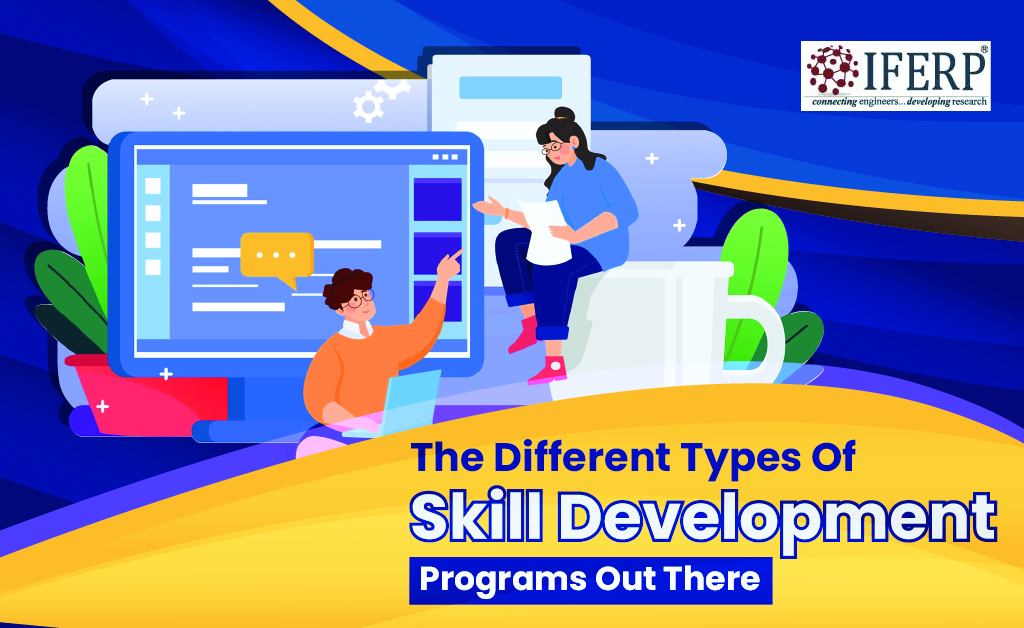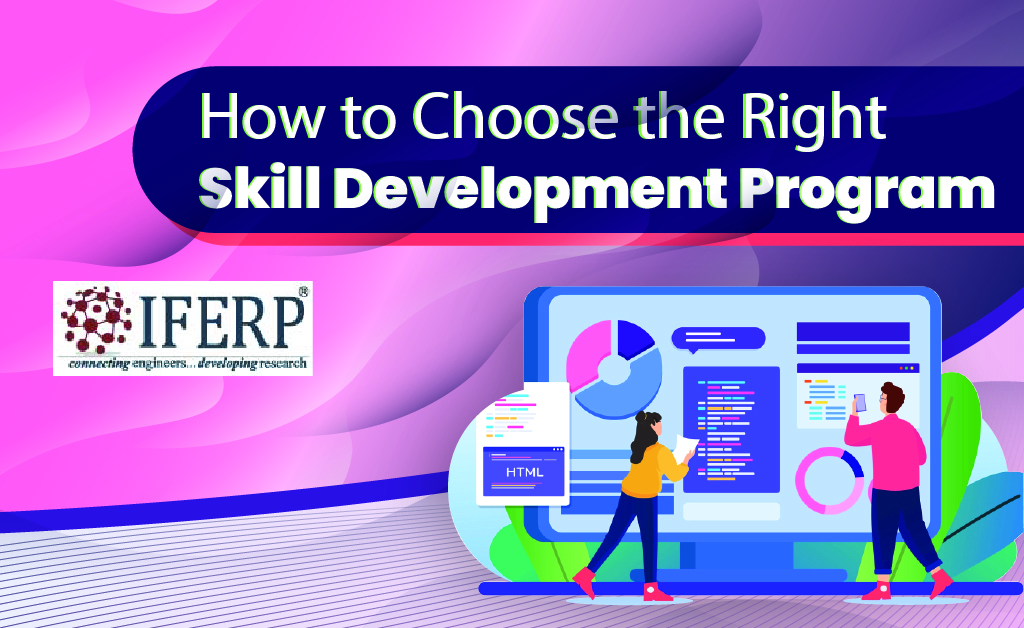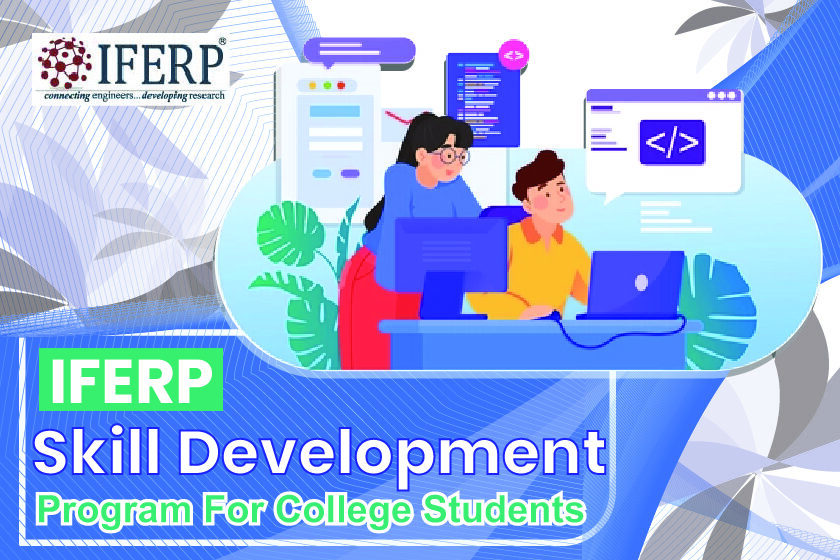IFERP skill development programs have become increasingly popular as an essential component of modern education. These programs offer students the opportunity to acquire new skills and enhance existing ones, ultimately preparing them for career success and personal lives. Explored below are various facets of skill development programs for students, delving into topics such as improving employability, fostering personal growth, and enhancing problem-solving abilities.
- Enhancing Employability & Career Prospects
- One of the main perks of participating in skill development programs is the improvement of students’ employability.
- By gaining new skills and refining existing ones, students become better equipped for the competitive job market.
- These programs often include courses that cater to specific industries or occupations, enabling students to tailor their learning to their career aspirations.
- Moreover, skill development programs often provide students with practical, hands-on experiences that are highly valued by employers, giving them a competitive edge when applying for jobs.
- Fostering Personal Growth
- Skill development programs also promote personal growth, as students are exposed to novel ideas and viewpoints.
- Through these programs, students learn to embrace challenges and push their boundaries, leading to increased confidence and self-esteem.
- Furthermore, the development of essential life skills, such as communication, teamwork, and time management, can have a significant impact on a student’s overall well-being and personal growth.
- Enhancing Problem-Solving Abilities
- Another crucial benefit of participating in skill development programs is the enhancement of problem-solving abilities.
- These programs often expose students to real-world problems, requiring them to think critically and develop innovative solutions.
- By honing their problem-solving skills, students become more adept at tackling complex issues and making informed decisions, both in their academic pursuits and everyday lives.
- Promoting Lifelong Learning
- Participation in skill development programs instills the value of lifelong learning in students.
- The constantly evolving nature of today’s job market requires individuals to stay updated with the latest skills and knowledge.
- Skill development programs help students develop a growth mindset and adapt to change, encouraging them to continue learning throughout their lives.
- Along with this, access to high-profile Scopus journals and publications will also be provided.
- Building A Strong Network
- Skill development programs often provide students with the opportunity to connect with professionals in their chosen fields.
- This networking aspect can be invaluable, as students can learn from the experiences of industry experts and form valuable connections that may lead to job opportunities or mentorship in the future.
- Enhancing Academic Performance
- Engaging in an IFERP skill development scheme can have a positive effect on a student’s academic performance.
- As they develop skills such as critical thinking, communication, and time management, students often find that they can apply these abilities to their academic pursuits, leading to improved performance in the classroom.
Participating in skill development programs offers students a wealth of benefits that extend far beyond the classroom. These programs provide students with the tools and resources necessary to succeed in their careers, foster personal growth, and develop essential life skills. Furthermore, students who engage in skill development programs are more prone to becoming lifelong learners and valuable contributors to society. As a result, it is crucial for educators, parents, and students alike to recognize the immense value of skill development programs and promote their inclusion in educational curricula.

The Different Types Of Skill Development Programs Out There
- Vocational Training Programs
- Vocational training programs focus on teaching students the specific skills required for a particular job or career.
- These programs are often hands-on and provide practical experience, enabling students to gain expertise in their chosen field.
- Some common vocational training programs include –
- automotive repair,
- culinary arts,
- graphic design, and
- information technology.
- Soft Skills Development Programs
- Soft skills development programs are designed to enhance students’ interpersonal and communication abilities, critical thinking, and problem-solving skills.
- These programs often involve group activities, workshops, and simulations, allowing students to practice and refine their soft skills.
- When it comes to how to develop soft skills for students, participating in IFERP skill development programs is the easy answer.
- Internships & Co-Op Programs
- Internships and co-op programs provide students with real-world work experience in their chosen field.
- These opportunities allow students to apply the skills and knowledge they have gained in the classroom to a professional setting, enhancing their employability and career prospects.
- Internships are usually short-term and can be paid or unpaid, while co-op programs are often longer and involve a partnership between the educational institution and an employer.
- Online Learning Platforms
- Online learning platforms offer a flexible and convenient way for students to develop their skills at their own pace.
- These platforms provide access to a wide range of courses, from academic subjects to skill-based training.
- Examples of popular online learning platforms include –
- Coursera,
- Udemy, and
- LinkedIn Learning.
- Language Learning Programs
- Language learning programs help students develop their proficiency in a foreign language, enhancing their communication skills and cultural understanding.
- These programs can be offered through educational institutions or private language schools and may involve –
- classroom instruction,
- immersive experiences, or
- online resources.
- Extracurricular Activities & Clubs
- Extracurricular activities and clubs provide students with opportunities to develop their skills and interests outside of the classroom.
- These activities can range from sports teams and music ensembles to debate clubs and robotics competitions.
- By participating in extracurricular activities, students can develop valuable skills such as –
- teamwork,
- leadership, and
- time management,
while also exploring their passions and interests.
- Community Service & Volunteer Programs
- Community service and volunteer programs allow students to give back to their community while developing essential skills.
- By engaging in volunteer work, students can gain experience in various fields, improve their interpersonal skills, and develop a sense of responsibility and empathy for others.
- Entrepreneurship & Innovation Programs
- Entrepreneurship and innovation programs help students develop the skills needed to start their own businesses or bring innovative ideas to life.
- These programs often involve workshops, mentorship, and access to resources such as funding and networking opportunities.
- Students participating in these programs learn about –
- business planning,
- marketing, and
- financial management, as well as
- creative problem-solving and
- risk-taking.
- Study Abroad & Cultural Exchange Programs
- Study abroad and cultural exchange programs provide students with the chance to experience diverse cultures and educational systems, broadening their perspectives and enhancing their adaptability.
- These programs can range from short-term exchanges to full academic year programs and often involve language learning and immersion in the host culture.
By exploring the various types of skill development programs available, students can identify the best opportunities to expand their skill set and enhance their employability, personal growth, and overall success in life. Attend an educational conference in 2023 as part of your skill development goals.

How To Choose The Right Skill Development Program
- Identify Your Goals & Interests
- The first step in choosing the right skill development program is to identify your goals and interests.
- Ask yourself what skills you would like to acquire or improve, and consider how these skills align with your career aspirations or personal interests.
- By having a clear understanding of your objectives, you can narrow down the range of programs that best suit your needs.
- Assess Your Current Skill Level
- Before selecting a skill development program, evaluate your current skill level.
- This assessment will help you determine whether you need a beginner, intermediate, or advanced course.
- Be honest with yourself about your abilities, as choosing a program that is too advanced or too basic may hinder your progress and result in frustration.
- Research The Available Options
- Once you have identified your goals and assessed your current skill level, research the available programs that cater to your needs.
- This research may involve browsing course catalogs, attending open houses or information sessions, and reading reviews from former participants.
- Be sure to explore different types of programs, such as –
- vocational training,
- online learning platforms, and
- extracurricular activities,
to find the best fit for your needs.
- Evaluate The Program’s Reputation & Quality
- Before enrolling in a skill development program, assess its reputation and quality.
- Look for accredited programs that are recognized organizations or have a strong track record of success.
- Additionally, consider the qualifications and experience of the instructors, as well as the program’s curriculum, facilities, and resources.
- High-quality programs will likely have positive reviews and testimonials from former participants, which can provide valuable insights into the program’s effectiveness.
- Consider The Time Commitment & Flexibility
- When choosing a skill development program, it is essential to consider the time commitment and flexibility it offers.
- Ensure that the program’s schedule aligns with your other commitments, such as work, school, or family responsibilities.
- Some programs may be part-time, full-time, or self-paced, allowing you to pick the option that best fits your schedule.
- Assess The Cost & Financial Aid Options
- The cost of a skill development program is an important factor to consider.
- While some programs may be free or low-cost, others may require a significant financial investment.
- Determine your budget and research financial aid options, such as –
- scholarships,
- grants, or
- employer-sponsored programs,
to help offset the cost of the program.
- Seek Advice From Peers & Professionals
- Consulting with peers and professionals can provide valuable insights into the best skill development programs for your needs.
- Reach out to friends, classmates, or colleagues who have participated in similar programs and ask for their recommendations.
- You can also consult with career counselors or academic advisors for guidance on selecting a program that aligns with your goals and interests.
- Visit The Program Or Attend A Trial Session
- If possible, visit the program or attend a trial session before enrolling.
- This experience can give you a better understanding of the program’s structure, teaching methods, and learning environment, allowing you to determine whether it is the right fit for you.
- Additionally, visiting the program can provide an opportunity to ask questions and interact with instructors and current participants.
By following these steps, you can effectively choose the right skill development program that aligns with your goals, interests, and needs. This careful selection process will help ensure that you invest your time and resources wisely, leading to a more successful and fulfilling learning experience.
Challenges Faced By Students When Attending Skill Development Programs & How To Overcome Them
- Time Management & Balancing Commitments
- One of the primary challenges faced by students participating in skill development programs is managing their time effectively.
- With multiple commitments, such as academics, extracurricular activities, and personal responsibilities, finding time for skill development can be difficult.
- The Solution –
- To overcome this challenge, students should create a structured schedule that allocates time for skill development alongside other priorities.
- They can also explore flexible or self-paced programs that allow them to progress at their own pace, making it easier to balance multiple commitments.
- Financial Constraints
- The cost of skill development programs can be a barrier for many students, particularly if the program requires a significant financial investment or ongoing expenses, such as course materials or transportation.
- The Solution –
- Students can seek financial aid options, such as scholarships, grants, or employer-sponsored programs, to help offset the cost of the program.
- Additionally, they can explore low-cost or free alternatives, such as online learning platforms, community-based workshops, or volunteer opportunities.
- Limited Access To Resources
- Some students may face challenges related to limited access to resources, such as inadequate technology, lack of transportation, or lack of availability of programs in their area.
- The Solution –
- Students can explore online skill development programs, which often provide greater accessibility and flexibility compared to traditional, in-person programs.
- For those with limited access to technology, local libraries or community centers may offer resources, such as computer access, workshops, or tutoring services.
- Lack Of Confidence Or Fear Of Failure
- Students may feel apprehensive about participating in skill development programs due to a lack of confidence in their abilities or fear of failure.
- The Solution –
- Students can overcome this challenge by starting with beginner-level courses or programs that provide a supportive learning environment.
- Seeking mentorship or guidance from instructors or peers can also help build confidence and alleviate fears of failure.
- Difficulty In Choosing The Right Program
- With a wide range of skill development programs available, students may face the challenge of selecting the most appropriate program for their needs and goals.
- The Solution –
- To overcome this challenge, students should conduct thorough research on the available options, consult with peers or professionals, and assess the program’s reputation and quality.
- By following a structured decision-making process, students can identify the best program for their needs.
- Maintaining Motivation & Commitment
- Participating in a skill development program requires dedication and commitment, and students may struggle to maintain their motivation over time.
- The Solution –
- Students can set realistic goals, track their progress, and celebrate their achievements to maintain motivation.
- Additionally, participating in programs with peers or joining a community of learners can provide support and encouragement, helping students stay committed to their skill development journey.
- Adapting To Different Learning Styles & Teaching Methods
- Skill development programs may involve various learning styles and teaching methods, and some students may find it challenging to adapt to these new approaches.
- The Solution –
- Students should be proactive in seeking support from instructors, classmates, or tutors to address any difficulties they encounter.
- They can also explore different learning strategies, such as note-taking techniques, study groups, or online resources, to adapt to different teaching methods.
By recognizing the challenges faced in participating in skill development programs and implementing effective strategies to overcome them, students can maximize the benefits of these programs and achieve their personal and professional goals.
Skill development programs are pivotal for students’ growth as they equip them with essential competencies for future career success and personal lives. These programs help students enhance their employability by teaching in-demand skills tailored to specific industries or occupations. By participating in skill development programs, students gain hands-on experiences and practical knowledge, which are highly valued by employers, extending to them a competitive edge in the job market.
Moreover, these programs foster personal growth by exposing students to new perspectives and challenges. They develop crucial life skills such as communication, teamwork, and time management, which significantly impact overall well-being. Skill development programs also sharpen problem-solving abilities as students tackle real-world problems and learn to think critically.
Additionally, these programs instill the value of lifelong learning, helping students adapt to the constantly evolving job market. By building strong networks and enhancing academic performance, skill development programs play a crucial role in preparing students for a successful future.


